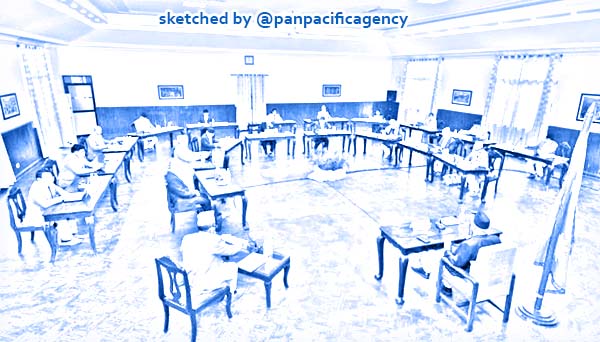Remote notarization of documents allowed in the Philippines

A meeting of the Council of Ministers at Prime Minister’s official residence, in Baluwatar, Kathmandu, on Wednesday, June 10, 2020. Photo Courtesy: Rajan Kafle/Prime Minister’s Secretariat. Sketched by the Pan Pacific Agency.
MANILA, Aug 2, 2020, The Manila Times. Remote notarization of paper documents is now allowed under an interim rule approved by the Supreme Court, The Manila Times reported.
But the high tribunal, in an en banc resolution, said the 2020 Interim Rules on Remote Notarization of Paper Documents “shall be limited to the notarization of paper documents and instruments with handwritten signatures or marks through the use of videoconferencing facilities.”
The rules do not apply to the execution of notarial wills.
The Supreme Court said the performance of notarial acts through video conferencing facilities applies in cases where the notary public or at least one of the principal residents holds office or is otherwise situated in a locality that is under community quarantine due to the coronavirus, as directed by the Inter-Agency-Task Force for the Management of Emerging and Infectious Diseases.
Under the rules, “notarial actions can only be done by a notary public with a valid and existing notarial commission, adding that any notarial act performed through the use of videoconferencing facilities shall have a legal effect and enforceable as any other notarial act performed under the 2004 Rules on Notarial Practice.”
The act requires “at least one current identification document (ID) issued by an official government agency bearing the photograph and signature of the individual.”
“The principal shall cause the delivery of the instrument or document requiring acknowledgement to the notary public by personal courier service. The document must be complete, bear the handwritten signature of the principal, and be placed in an envelope sealed with initials of the principal,” it said.
“If the principal is not personally known to the notary public, he or she shall be required to provide the notary public, by personal or courier service, two copies of complete evidence of identity as defined under the Rules,” it said.
The principal will also submit to the notary public a video clip, either in CD (compact disc) or USB (universal serial bus), showing that he or she actually signed the instrument delivered for acknowledgment, which shall be placed in the sealed envelope.
The Supreme Court said that once the sealed envelope is received, the notary public should schedule a videoconference with the principal, during which the notary public would require “the principal to confirm his or her identity, confirm his location through global positioning satellite or by showing identifiable landmarks or building within the vicinity, the presence of witnesses, among others.
The rules shall take effect 15 days after their complete publication in the Official Gazette or in at least two newspapers of national circulation and shall remain effective until the Court directs otherwise.